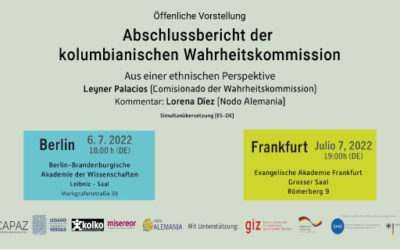More than 60 European organisations pronounce themselves towards a new aggression against the Community.
30th of January 2018
Roberto de Figueiredo Caldas
President of the Inter-American Court of Human Rights/Costa Rica
Ref: Security guarantees for the members of the Peace Community of San Jose de Apartado, after the attack against its legal representative and another member perpetrated on the 29th of December
Honorable Judge Roberto de Figueiredo Caldas:
We, the undersigned organizations and international networks, address this letter to you in order to express our profound concerns at the attempt on the life of the legal representative of the Peace Community of San Jose de Apartado, German Graciano Posso, that took place on the 29th of December in the region of Uraba (Colombia). This community has been the beneficiary of precautionary measures from the Inter-American Commission of Human Rights since 1997 and since 2000 it has been the beneficiary of provisional measures from the Inter-American Court of Human Rights. On the 6th of December 2016, the Inter-American Commission of Human Rights declared admissible the case of presumed responsibility of the Colombian state in the multiple human rights violations1 suffered by the Peace Community from 1997 to date.
As you stated yourself in the Inter-American Court Resolution of the 26th of June 2017, the Peace Community, in particular the legal representative Mr. Graciano Posso, had received several threats throughout the previous months2 and that there were several requests made to the Colombian state to guarantee the security of Peace Community members “(…) the state should adopt the special and individual measures necessary to protect the life and physical integrity of the mentioned individuals [German Graciano Posso, Gildardo Tuberquia, Arley Tuberquia, Cristobal Meza], who are already beneficiaries of current provisional measures”3.
Guaranteeing the right to life is an unalienable state responsibility, due to the fact it is a fundamental value of the Constitution. In this context, it is incomprehensible that the Peace Community has not received adequate protection from human rights violations and that the Colombian state has not taken the threats against its citizens seriously. Despite the Peace Community publically denouncing the existence of a plan to assassinate the legal representative German Graciano Posso one week prior to the incident, on the 29th of December 2017 the plan to assassinate him was carried out. Five presumed members of the Gaitanista Self-Defense Forces (AGC) entered into a storehouse on the Peace Community’s private property with lethal weapons and attempted to assassinate Mr. Graciano Posso and another leader, wounding in the struggle both Mr Posso and another leader4.
The members of the community, acting in self-defense, managed to immobilize and detain two of the attackers. The following day, after communicating successfully with state civil institutions, the Peace Community handed over the two men to the Investigative Unit of the Public Prosecutor’s Office, in the presence of the Interior Ministry and the Human Rights Ombudsman’s Office. With this act the Peace Community hoped there would be an investigation leading to sanctions against those responsible. However, 24 hours later the two men were freed.
Even more worrying is that Colombian state institutions had previously verified the situation and warned of the serious risks faced by those who defend human rights due to the presence of neo-paramilitary groups in the region. Despite these warnings sufficient action was not taken to guarantee the security of the Peace Community. In July 2017, the Human Rights Ombudsman’s Office’s Early Warning System published its fifth report on the Uraba region. The report warned that the AGC are looking to expand their territorial control in rural and urban areas, and that they have “constituted a factor that has increased the risk that the civil population might suffer threats, confinement, forced recruitment, (…), selective assassinations (…)”5. Likewise, after visiting the region in July 2017 the Human Rights Ombudsman outlined the risks facing several organizations in the region, highlighting the Peace Community6. In April 2017 the Inter-American Commission of Human Rights had already emphasized the situation of extreme violence that continued to affect the Peace Community, with reports of ”strong indications that state security agents were acting in collusion with illegal armed groups”7. These reports are supported by news in November 2017 of an arrest warrant issued by the Public Prosecution Office for a high-ranking member of the Uraba Police Force for presumed collaboration with the illegal armed group the Gulf Clan8.
Once again we note how high-ranking public servants and government officials don’t respect legal sentences9 or policies10 and continue to stigmatize the defense of human rights. We quote the comments made by the Minister of Defense, Luis Carlos Villegas, in an interview on the 16th of December last year, in which he stated that the increase in assassinations of human rights defenders after the signing of the Peace Agreement between the Colombian Government and the Revolutionary Armed Forces of Colombia (FARC) in November was due to “relationship problems”, disputes between neighbors and drug trafficking11. On the 2nd of January, only four days after the attack on Mr. Graciano Posso, the Governor of Antioquia, Luis Pérez Gutiérrez, stated that there were no paramilitary groups in San Jose de Apartado and that the assassins were “just some guys, one of them was even the Community’s hairdresser,” further stigmatizing the Peace Community saying that it was “the boy who cried wolf”12. This was a clear attempt to divert attention from the serious incident and discredit the denunciations made by the Peace Community, the Human Rights Ombudsman’s Office, and other national and international organizations.
These declarations, combined with high levels of impunity, increase the serious risk faced by Peace Community members. They do not contribute to the reconstruction of confidence necessary to implement protection measures, solicited in, amongst others, Court Order 164 issued by the Constitutional Court in 201213; instead they create a serious risk factor that can lead to new human rights violations causing unrepairable damage for the Peace Community members.
Based on what has been mentioned, and in order to comply with the provisional measures issued by the Inter-American Court, we request that the Court once again insists that the Colombian state fulfills its national and international obligations, that it respects the orders relating to the Peace Community issued by the Constitutional Court, as well as the provisional measures, and that it immediately:
Carries out an investigation that establishes the responsibilities in all the denounced incidents regarding the complicity between members of the XVII Brigade of the National Army of Colombia and the National Police of Urabá with paramilitary structures and / or other criminal structures that operate in San José de Apartadó.
Carries out an investigation leading to sanctions for public servants who operate in contrary to Directive 002 of the Office of the Attorney General and continue to stigmatize the work of human rights defenders.
Complying with Court Order 164/2012 issued by the Constitutional Court, takes adequate and concerted measures to guarantee the life, security and physical integrity of the members of the Peace Community of San Jose de Apartado; and in general, social leaders and human rights defenders in Colombia.
Yours Sincerely,
1. ABColombia (Red de organizaciones de Gran Bretaña e Irlanda)
2. Agir pour la Paix (Bélgica)
3. Asociación Ayujara (Estado Español)
4. Asociación Burgalesa de Impulso Social (Estado Español)
5. Asociación de Solidaridad con Colombia Katío (ASOC- Katío) (Estado Español)
6. Asociación Pro Derechos Humanos de España (Estado Español)
7. Caritas Norge (Noruega)
8. Caritas Suiza (Suiza)
9. Christian Aid (Gran Bretaña)
10. Colombiagruppen – Plataforma Sueca por Colombia (Suecia)
11. Colombian Caravana (Gran Bretaña)
12. Comisión de Ayuda al Refugiado en Euskadi (CEAR-Euskadi, Estado Español)
13. Comisión Ética – Madrid (Estado Español)
14. Comité Colombiano por la Paz de Colombia (Madrid)
15. Comité Daniel Gillard (Bélgica)
16. Comité madrileño de defensa de los DDHH en Colombia „COMADEHCO“ (Estado Español)
17. Consejo de laicos de la diócesis de Aquisgrán (Alemania)
18. Consejo Latinoamericano de Iglesias -CLAI-
19. Coordinació Valenciana de Solidaritat amb Colómbia (CEAR-PV, CEDSALA, Colectivo Sur-Cacarica, Entreiguales Valencia, Intersindical Valenciana y Mundubat, Estado Español)
20. Coordinadora de ONGDs de Burgos (Estado Español)
21. El Movimiento Sueco por la Reconciliación (SweFOR)
22. Fondo de Acción Urgente para América Latina y el Caribe FAU – AL
23. Federación Internacional para los Derechos Humanos (FIDH), en el marco del Observatorio para la Protección de los Defensores de Derechos Humanos
24. Fellowship of Reconciliation -FOR
25. Fokus (Noruega)
26. Fondo Noruego de Derechos Humanos (Noruega)
27. Forum Syd (Suecia)
28. Fundación Mundubat (Estado Español)
29. Fundación Sueca para los Derechos Humanos (Suecia)
30. Grupo de Trabajo Suiza – Colombia (Suiza)
31. Grupos Noruegos de Solidaridad LAG (Noruega)
32. Health and Human Rights Info (Noruega)
33. Iglesia Sueca
34. IGP – Instituto del Trabajo para la Paz Global – Tamera (Portugal)
35. Iniciativa Solidaria Internacionalista de Burgos (Estado Español)
36. Iniciativas de Cooperación Internacional para el Desarrollo (ICID) (Estado Español)
37. Kolko – Derechos Humanos por Colombia (Alemania)
38. Magdalena Norway (Noruega)
39. Mensen met een Missie (Países Bajos)
40. Norwegian People’s Aid (Noruega)
41. Oidhaco (Red de organizaciones internacionales)
42. Operation 1325 (Suecia) 43. Organización Mundial Contra la Tortura (OMCT), en el marco del Observatorio para la Protección de los Defensores de Derechos Humanos
44. Oxfam
45. Pax Christi – sección alemana (Alemania)
46. Pax (Países Bajos)
47. Paz con Dignidad (Estado Español)
48. Peace Brigades International
49. PeaceWorks (Suecia)
50. Plataforma de Burgos de Apoyo a la Comunidad de Paz de San José de Apartadó
51. Burgos con Colombia (Estado Español)
52. Plataforma Suiza por Colombia (Red de organizaciones, Suiza)
53. Public Service Alliance of Canadá
54. Red Europea de Solidaridad con Colombia (Estado Español)
55. Red Flamenca de Solidaridad con la Comunidad de Paz de San José de Apartadó (Bélgica)
56. Red Francia Colombia Solidaridades – RFCS (Red de organizaciones, Francia)
57. Red Internacional de Derechos Humanos RIDH (Suiza)
58. Rete Italiana di Solidarietà con le Comunità di Pace Colombiane Colombia Vive! (Italia)
59. Soldepaz.Pachakuti (Estado Español)
60. Steelworkers Humanity Fund (Canadá)
61. Swissaid (Suiza)
62. Swedish Foundation for Human Rights (Suecia)
63. Taula Catalana por la Paz y los Derechos Humanos en Colombia (Red de organizaciones de Cataluña, Estado Español)
64. Tierra de Hombres (Suiza)
65. Washington Office on Latin America WOLA (EEUU)
66. WILPF España (Liga Internacional de Mujeres por la Paz y la Libertad)
CC:
Presidente de la Comisión Interamericana de Derechos Humanos
Relator sobre Defensoras y Defensores de Derechos Humanos de la Comisión Interamericana de Derechos Humanos
Oficina del Alto Comisionado de las Naciones Unidas para los Derechos Humanos en Colombia
Relator Especial de las Naciones Unidas sobre la situación de las y los defensores de derechos humanos
Misión de Verificación de la ONU en Colombia
Vicepresidencia de la República
Cancillería de Colombia
Consejera Presidencial para los Derechos Humanos
Ministro de Interior
Procurador General de la Nación
Defensor del Pueblo
Comisión Nacional de Garantías de Seguridad
1 Extrajudicial killings, forced disappearance, torture, cruel treatment and wounding, sexual violence, arbitrary detention, the stigmatizing of community members, presentation of individuals as false positives by the military, damage or loss of property, forced displacement, lack of due process and unjustified delays in investigations, which can all be characterized as possible violations of articles 3, 4, 5, 7, 8, 11, 13, 15, 16, 21, 22 y 25 of the American Convention, all in relation to articles 1.1 and 2.2 of the same instrument. See OEA/Ser.L/V/II.159, Doc. 70, Report No. 61/16, 6th of December 2016.
2 Ibid.
3 “On the other hand, referring to the situation of German Graciano Posso, Gildardo Tuberquia and Cristobal Meza, the President observes that between December 2016 and February 2017, they have been objects of threats on their lives and personal integrity.” Inter-American Court of Human Rights (CorteIDH) Resolution of the President, 26th of June 2017.
4 Comunidad de Paz de San José de Apartadó: “En la mira de planes muy perversos”, 21st of December 2017.
5 Defensoría del Pueblo: Informe del Riesgo No. 035.17, 19th of July 2017.
6 Defensoría del Pueblo: Defensoría verifica amenazas y actos violentos contra la población de San José de Apartadó (Antioquia), 28th of July 2017.
7 CorteIDH: Resolución del Presidente, 26th of June 2017.
8 Known as well as Gaitanista Self-Defense Forces (AGC). El Espectador: “Capturado mayor de la Policía por vínculos con alias Inglaterra”, 26th of November 2017.
9 Corte Constitucional: Sentencia T-1191, 25th of Noviembre 2004.
10 Procuraduría General de la Nación: Directiva 002, 14th of June 2017.
11 Canal 1: “El ministro de Defensa dice que a los líderes los matan por líos de faldas y de vecinos”, 16th of December 2017.
12 Gobernación de Antioquia: “Rueda de Prensa Consejo de Seguridad”, 2nd of January 2018, minute 9:00.
13 Corte Constitucional: Auto 164/2012, 6th of July 2012.
Related File:
180130 Letter about Peace Community CorteIDH



